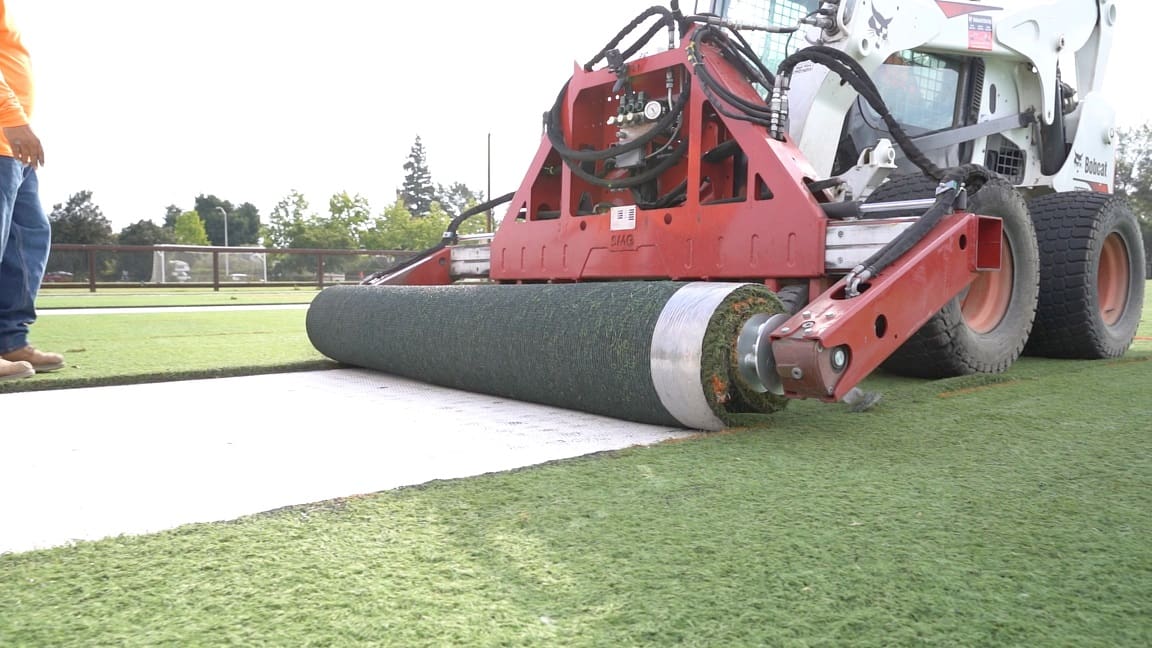- Joint program with ExxonMobil and Cyclyx International designed to help solve longstanding challenge: how to efficiently recycle synthetic grass
- Program will begin by processing 50 aged turf fields, mostly from California, via ExxonMobil’s advanced recycling technology in Texas
- Synthetic turf systems can play a critical role in conserving water in drought-prone regions, reducing the emissions associated with grass mowing and decreasing the use of pesticides and fertilizers

TenCate Grass, the world’s leading manufacturer, distributor and installer of synthetic turf for sports and landscape applications, announced today a first-of-its-kind program in the U.S. to recycle end-of-life artificial grass — a groundbreaking initiative that leverages Cyclyx’s feedstock processing expertise and ExxonMobil’s ExxtendTM technology for advanced recycling.
The goal of this effort is to help solve the problem that has challenged the industry for years: how to efficiently and effectively recycle synthetic turf into feedstock that can be used to create new turf and other valuable products.
“At TenCate, we are committed to leading the industry and moving sustainability forward in a meaningful way,” said Joe Fields, President and CEO of TenCate Grass Americas. “We understand the issue of end-of-life synthetic turf, and we have taken it upon ourselves to find a true solution for the entire industry. Our goal is to keep turf out of landfills and put it back to use.”
Known as TenCate Turf Recycling Solutions, the program is starting by processing 50 aged turf fields from high schools and college campuses. The end-of-life turf will be shipped to a Southern California facility where it will be shredded.
The shredded turf will then be delivered from California to Texas, where Cyclyx International will further pre-process it before sending the turf to ExxonMobil’s Baytown advanced recycling facility. With ExxonMobil’s proprietary Exxtend™ technology, the end-of-life turf will be broken down into raw materials that can be used to make new products that are no different in quality and performance than those made from virgin raw materials. In addition to strengthening the circularity of plastics, ExxonMobil has found that its advanced recycling technology does so while delivering lower relative GHG emissions when compared to processing the same amount of fossil-based feedstocks.[1]
“Our advanced recycling technology has already processed millions of pounds of otherwise difficult to recycle plastics, like food packaging and artificial turf, that are generally not recycled today,” said Dave Andrew, Vice President of New Market Development at ExxonMobil. “With our scalable technology and collaborations like this one alongside TenCate Grass and Cyclyx, we are helping to meet the growing demand for circular products.”
ExxonMobil’s advanced recycling facility in Baytown has processed more than 11 million pounds of plastic waste, as of June 2022. ExxonMobil is expanding to a large-scale advanced recycling facility at the site, which, upon startup later this year, will be among North America’s largest advanced plastic recycling facilities, with the capacity to recycle 66 million pounds of plastic waste per year. Beyond Baytown, plans are underway for up to 1 billion pounds of advanced recycling capacity annually by year-end 2026 across multiple sites globally.
This program with ExxonMobil and Cyclyx builds on TenCate’s groundbreaking efforts to recycle synthetic turf. In the Netherlands, where the company headquarters are located, TenCate recycles its end-of-life turf into Ecocept®, an elastic layer in sports fields, and third parties also use the agglomerated material to manufacture new products.
TenCate now wants to expand its recycling efforts worldwide.
“As the global leader of synthetic turf, we have made sustainability a keystone in everything we do,” Fields said.
After this initial phase is complete, TenCate plans to expand the initiative across the U.S. — an effort that’s needed now more than ever. In North America alone, the total value of installed synthetic turf systems was estimated at $2.7 billion in 2020, according to the Synthetic Turf Council. This translates into roughly 265 million square feet of installed turf.
Numerous factors are driving this demand. Synthetic turf:
- Conserves water. Depending on the region, a typical grass sports field in the U.S. requires between 500,000 to a million gallons of water or more each year. During 2010, between 3 billion to 8 billion gallons of water were conserved through the use of synthetic turf. This is becoming even more critical with an increase in droughts and new regulations around water usage.
- Saves time and labor. Synthetic turf does not need to be watered, fertilized or mowed. Synthetic turf can also help reduce noxious emissions from mowing and other maintenance. The EPA estimates gas-powered lawnmowers account for 5% of the air pollution in the United States.
- Decreases the use of pesticides and fertilizers. Synthetic turf eliminates the need for nearly a billion pounds of pesticides, fertilizers, fungicides and herbicides that are used to care for grass.
Finding an effective way to recycle synthetic turf will make it an even better option. Although many companies talk about the recyclability of artificial grass, that usually means the old turf is repurposed for use in other applications, such as in batting cages or for groundcover. But ultimately, this turf ends up in landfills or discarded piles.
Instead, TenCate’s program with ExxonMobil and Cyclyx will turn end-of-life turf into virgin-quality new products. Through advanced — also known as chemical — recycling, the shredded turf will be broken down into its molecular building blocks, mixed with other hydrocarbon feedstocks, then made back into the raw materials used to create new products. This allows plastic waste to be converted into new products that are no different in quality and performance than those made from virgin natural resources.
To accelerate efforts, TenCate became the first synthetic turf supplier to join Cyclyx, a consortium-based company that works with partners throughout the supply chain to find innovative ways to collect and pre-process a variety of plastics to meet the specifications of both mechanical and advanced recyclers. Its mission is to increase the recyclability of plastic from 10% to 90%.
“This collaboration with TenCate and ExxonMobil is notable in many ways,” said Joe Vaillancourt, CEO of Cyclyx. “It allows the ability to aggregate new types of waste plastic materials that have historically been ignored; it not only allows recycling of that turf material but provides a fully circular recycling option; and it shows the power of the collaboration that can help drive our mission of increasing the recyclability of waste plastic from 10% to 90%.”
About TenCate Grass
TenCate Grass is the world’s leading manufacturer, distributor and installer of synthetic turf solutions for sports and landscape applications. Headquartered in the Netherlands, with manufacturing facilities in the Netherlands, the United States and the United Arab Emirates, the company serves customers in more than 40 countries with a suite of well-known brands. The company is fully vertically integrated, which enables it to control the full chain from R&D, through manufacturing, installation, maintenance and now, recycling. For more information, please visit https://www.tencategrass.com.





























































